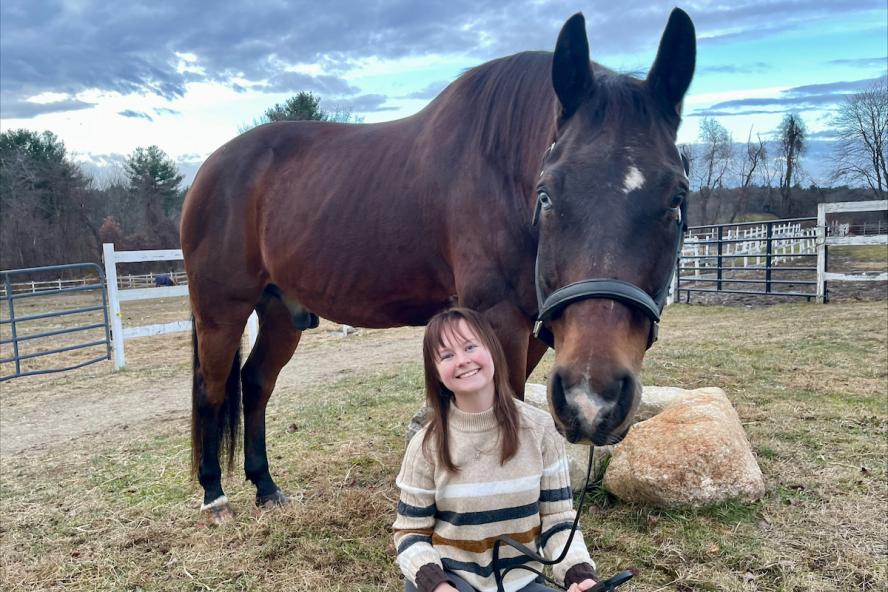In just two years in the Doctor of Veterinary Medicine program at Cummings School of Veterinary Medicine at Tufts University, third-year student Megan Gulsby (she/her) has become a student leader while following in the footsteps of her mentor, Dr. Matthew Eyles, V05.
A native of Pensacola, Florida, Gulsby worked weekends with Dr. Eyles at a small animal emergency and critical care hospital while earning a B.S. in biomedical sciences from the University of West Florida. “Dr. Eyles taught me the breadth of opportunity available in the veterinary field and provided me with invaluable knowledge that I lean on daily, and he continues to provide me guidance,” Megan says.
By participating in multiple research projects as an undergrad, Megan developed a passion for scientific discovery. “I wanted to choose a career where I could integrate medicine and research because I love both,” she explains. “I chose Cummings School because of how open and welcoming the students and faculty were from the start of my application process. Additionally, the opportunity to be mentored by veterinarians in laboratory animal medicine from both Tufts and surrounding institutions drew me here and led me to become a D.V.M./M.S.-LAM student.” A D.V.M./M.S.-LAM dual degree provides veterinary students with training in laboratory animal medicine and animal resource management to prepare graduates for professional opportunities in biomedical research.
A summer internship at Brown University’s Center for Animal Resources after her first year at Cummings School reaffirmed Megan’s commitment to becoming a lab animal veterinarian. “It was a great foundational experience of how a vivarium (an enclosure for keeping animals under semi natural conditions for observation) works and how important the animal care staff is for caring and advocating for the animals used in research,” she contends.
On campus, Megan became immersed in school activities, as a member of both Cummings Gather and the Student Veterinary Emergency and Critical Care Society, among other endeavors.
“Through these positions, I have had the opportunity to plan and host many educational and community building events,” Megan says. “I am passionate about creating new experiences for my peers and increasing the cohesiveness of our community.” Some events she has planned include several social gatherings, an ECC Skills Wet Lab, Gastropexy Wet Lab, Free Rabies Vaccine Clinic, and a wide range of lunch and dinner talks.
Nationally, Megan has served as a delegate and wellbeing officer to the Student American Veterinary Medical Association (SAVMA). As a delegate she attends meetings with representatives from other veterinary schools, discussing and voting on topics affecting all students. “I learned so much from every student and discovered that although we share a common goal, there are many ways to get there,” she says.
Wellbeing officer is a newly created SAVMA position. Each officer is tasked to identify wellbeing concerns on their campus, increase connections among students at each school, and serve as a liaison among students to SAVMA members and governing organizations.
Megan has sought additional opportunities to supplement her education, such as working in the Intensive Care Unit during the spring semester of her first year on campus, and completing a summer research project. Last summer she worked with Elizabeth Byrnes, Ph.D., and Fair Vassoler, Ph.D., to complete a project titled “Prenatal Oxycodone Exposure and Neurodevelopmental Expression of the Epigenetic Regulator MeCP2,” which she presented at Cummings School’s Veterinary Research Day in late August. Byrnes is a professor and Vassoler is an assistant professor in the Department of Comparative Pathobiology.
“Through this experience, I ran a cohort of animals partially through a study, which will be invaluable to my career as a lab animal veterinarian,” Megan explains. “It allowed me to see problems from the perspective of a researcher instead of an animal care staff member. In the future, this will help me provide the best animal care and welfare to the animals while they are involved in a study.”
Megan believes that her Cummings School education and experience are helping her to develop a path toward a rewarding career. “After graduation, I hope to pursue a residency to become a Diplomate of the American College of Laboratory Animal Medicine,” she says. “Ultimately, my career goal is to be a strong advocate for the animals used in research and work with scientists, doctors, veterinarians, and other animal advocates to continue to improve their lives by implementing the three Rs [reduce, refine, and replace].”
